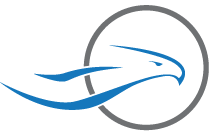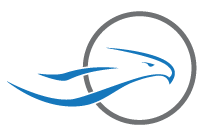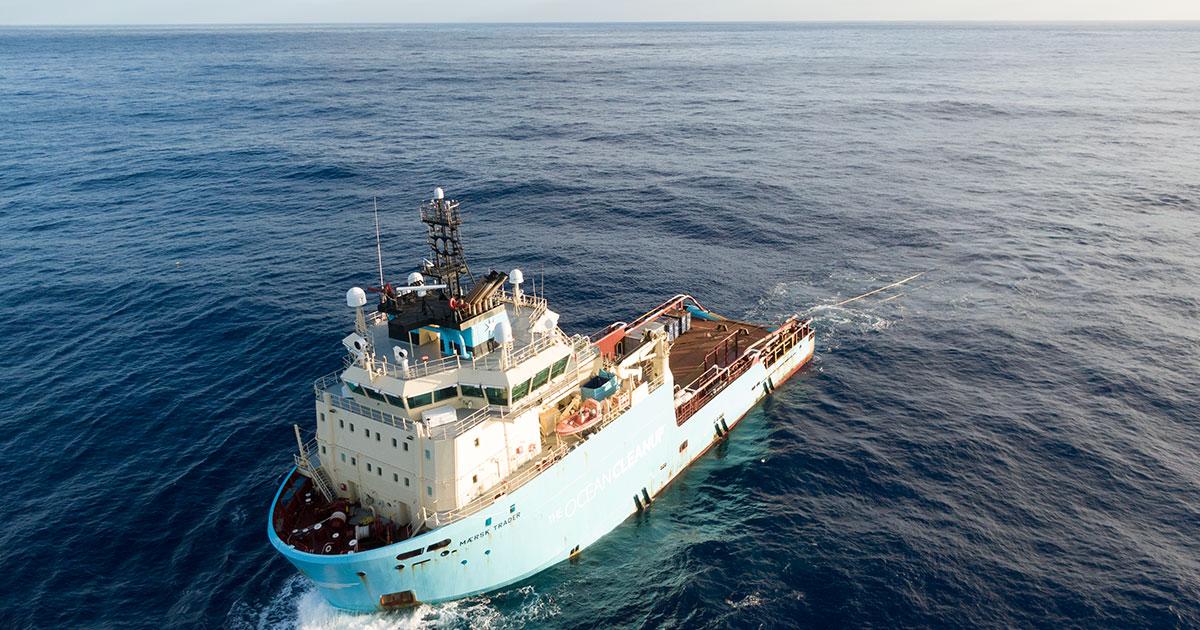Marine Ventures International, Inc. (MVI) provides Protected Species Observers (PSOs) for the non-profit organization The Ocean Cleanup. The Ocean Cleanup aims to clean up 90% of floating plastic pollution by developing and scaling technologies to remove plastics (The Ocean Cleanup 2022).
The Ocean Cleanup launched their most recent System 002, also known as Jenny, in August 2021 to collect floating debris from the surface of the Pacific Ocean in the Great Pacific Garbage Patch (GPGP). System 002 is a retention system comprising two wings of approximately 800 meters in length and a retention zone towed by two vessels, M/V Maersk Tender and M/V Maersk Trader, to collect buoyant plastic debris. The wings are designed to guide plastics into the retention zone. The retention zone captures the plastic and is brought on deck of the M/V Maersk Tender to be sorted for recycling. System 002 is the first large-scale cleanup system implemented by The Ocean Cleanup, using data from System 001 and 001/B The Ocean Cleanup formulated the System 002 design (The Ocean Cleanup 2022). The Ocean Cleanup is continuously looking to improve technologies and create the most efficient system to clean up ocean plastics.
The PSOs on board the towing vessel M/V Maersk Trader monitor for protected species during towing and extraction operations, as well as during transit for vessel strike avoidance. There are two PSOs working onboard the M/V Maersk Trader. The PSOs monitor for protected species and implement mitigation measures to prevent injury to International Union of Conservation of Nature (IUCN) red list animals during the plastic collection operations performed by The Ocean Cleanup. It is a challenging job that requires attention to detail and multitasking. The PSOs must have excellent communication skills to quickly relay messages to crew during mitigation and rescue efforts of protected species.
The Ocean Cleanup voluntarily requested PSOs to help monitor and mitigate for protected species during towing and plastic extraction operations. The PSOs work for this project is much different than most PSO positions. PSOs often help with the sorting of plastics and deploying the system. Deployment of the system involves connecting the retention zone to the wing segments and placing the system in the water to begin plastic collection. Some monitoring methods are unique to this project. In addition to visual monitoring, PSOs can watch a live feed on skiff cameras and playback footage from inside the nets to collect data and monitor for protected species such as sea turtles entering the system. Night vision devices, infrared cameras are employed as well. Some PSOs have acquired drone pilot licenses to monitor via drones during favorable weather conditions. The Ocean Cleanup also has many other mitigation measures in place to help protect marine wildlife. The system is equipped with two emergency release mechanisms that will allow the cod end to open if a protected species is observed inside the nets. The system also has fyke openings to allow marine wildlife to escape the system. There are also lights inside the retention zone so the PSOs can monitor during nighttime operations.
The Ocean Cleanup crew works with our PSOs to improve this system and future systems, often requesting feedback from our PSOs to minimize the risk to protected species. “We have noticed a very high interest in the wildlife in the area from everyone onboard. The crew is constantly asking us questions on animal behavior, and they show a very genuine interest in understanding how to prevent incidents with protected species,” says Rebeca Orue, Lead PSO. “Every mitigation measure implemented has been performed in a professional manner. Although it can be a very stressful situation, the entire team onboard remains calm, everyone listens and are very eager to help and understand the necessary precautions to protect marine wildlife,” says Sebastian Orue, Lead PSO. Our lead PSOs, Sebastian and Rebeca, have worked diligently with the crew to help improve mitigation measures and have been an asset to our PSO team.
MVI is thrilled to be part of such an important project and provide PSOs with expertise in monitoring and mitigating impacts of protected species. Our PSOs have extensive experience working offshore conducting protected species observation, as well as fisheries management experience, and extensive knowledge of sea turtle biology and behavior, giving them a unique skill set to provide the best management practices for all species living in the GPGP.


